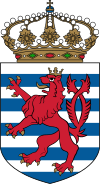The Left (Luxembourg)
The Left Déi Lénk | |
|---|---|
 | |
| Leader | Collective leadership (National Coordination) |
| Founded | 30 January 1999 |
| Headquarters | 5, rue Aldringen, Luxembourg |
| Youth wing | |
| Ideology | Democratic socialism[1] Soft Euroscepticism |
| Political position | Left-wing[2] to far-left[3] |
| European affiliation | Party of the European Left[4] |
| Colours | Red |
| Chamber of Deputies | 2 / 60
|
| European Parliament | 0 / 6
|
| Local councils | 8 / 600
|
| Website | |
| dei-lenk | |
 |
|---|
|
The Left (Luxembourgish: Déi Lénk [dəɪ ˈleŋk], French: La Gauche, German: Die Linken) is a democratic socialist[1] political party in Luxembourg.
The Left was founded by the and the Communist Party (KPL) as an electoral party. It had members from both parties and independents.[5] In the 1999 national elections, the Left won 3.3% of the votes and one seat in the parliament; André Hoffmann was elected from the southern constituency. In 2000, after anticipated elections in the city of Esch sur Alzette, Hoffmann became deputy mayor and (KPL) succeeded him in parliament. Then, in 2002, in accordance with the Left's statutes, Bisdorff resigned from parliament and was succeeded by .
Later, however, a dispute arose between a number of members of the Communist Party and the majority of the Left. As a consequence, the KPL and the Left ran separate lists in the 2004 elections. The Left won 1.9% of the votes, and accordingly lost its parliamentary presence. In the 2009 elections, it increased its share of the vote to 3.3%. As a result, Hoffmann returned to Parliament as the Left's sole representative - Hoffmann's personal vote of 9,067 in the south constituency was almost equal to the total number of votes gathered by the Communist Party, which won 10,803 votes.[6]
The Left is associated with the European United Left–Nordic Green Left group in the European Parliament. It does not currently have any members in the European parliament, however. The party participates in the Party of the European Left.
Election results[]
Parliament[7][]
| Election | Votes | % | Seats | +/– | Government |
|---|---|---|---|---|---|
| 1999 | 110,274 | 3.3 (#6) | 1 / 60
|
— | Opposition |
| 2004 | 62,071 | 1.9 (#6) | 0 / 60
|
Extra-parliamentary | |
| 2009 | 109,184 | 3.3 (#6) | 1 / 60
|
Opposition | |
| 2013 | 161,759 | 4.5 (#6) | 2 / 60
|
Opposition | |
| 2018 | 193,594 | 5.5 (#7) | 2 / 60
|
Opposition |
| Constituency | 2013 votes |
% | 2009 votes |
% | 2004 votes |
% | 1999 votes |
% |
|---|---|---|---|---|---|---|---|---|
| Centre | 51,851 | 5.75 | 35,411 | 3.50 | 20,451 | 1.99 | 27,999 | 2.82 |
| East | 5,941 | 3.05 | 3,911 | 2.25 | 2,179 | 1.31 | 2,448 | 1.63 |
| North | 8,138 | 2.56 | 5,785 | 2.00 | 3,725 | 1.34 | 3,653 | 1.41 |
| South | 95,829 | 5.73 | 64,077 | 4.13 | 36,868 | 2.28 | 76,174 | 4.98 |
European Parliament[8][]
| Election | Votes | % | Seats | +/– |
|---|---|---|---|---|
| 1999 | 28,130 | 2.8 | 0 / 6
|
— |
| 2004 | 18,345 | 1.7 | 0 / 6
|
|
| 2009 | 37,929 | 3.4 | 0 / 6
|
|
| 2014 | 67,513 | 5.8 | 0 / 6
|
Footnotes[]
- ^ Jump up to: a b Nordsieck, Wolfram (2018). "Luxembourg". Parties and Elections in Europe. Retrieved 10 April 2019.
- ^ Josep M. Colomer (24 July 2008). Comparative European Politics. Taylor & Francis. pp. 221–. ISBN 978-0-203-94609-1. Retrieved 13 July 2013.
- ^ http://www.lequotidien.lu/politique-et-societe/communales-dei-lenk-loriginal-plutot-que-la-copie/
- ^ EL-Parties. European Left. Retrieved 15 December 2018.
- ^ Wagener, Sascha (2009). "The Left in Luxemburg" (PDF). Daiber, Birgit/Hildebrandt, Cornelia, the Left in Europe. Political Parties AndParty Alliances Between Norway and Turkey: 30–40. Retrieved May 23, 2018.
- ^ Netgen, Éric (2009-06-11). "Empire of the Census". Le Jeudi. Archived from the original on 2009-06-15. Retrieved 2009-06-27.
- ^ Gouvernement du Grand-Duché de Luxembourg. "Élections légslatives".
- ^ Gouvernement du Grand-Duché de Luxembourg. "Élections europénnes".
References[]
- Wehenkel, Henri, Communisme et postcommunisme au Luxembourg, in: Communisme 2014, 1989-2014 - L'éternel retour des communistes, p. 165-172
- Wehenkel, Henri/Redondo, Jean-Laurent/Hoffmann, André/Urbany, Serge, Table ronde: PCL et/ou nouvelle gauche: renouvellement et/ou scission, in: Cahiers Marxistes, No. 201, April-May 1996, p. 121-144
External links[]
- 1999 establishments in Luxembourg
- Party of the European Left member parties
- Democratic socialist parties in Europe
- Political parties established in 1999
- Political parties in Luxembourg
- Socialist parties in Luxembourg